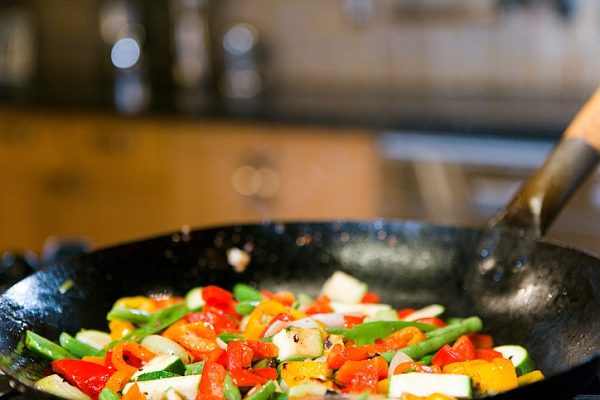Once, the worst words for a dinner host or waiter were those uttered, “I’m a vegetarian,” only to be outdone by the impending sense of culinary doom surrounding the words, “I’m a vegan.”
But times have changed, and vegetarianism has been widely accepted for some time, with veganism (still meeting some trepidation) also being ushered into the mainstream. Susan Rolnick, vice president of marketing for Vitasoy USA, Inc.’s brand Nasoya, based in, Ayer, MA, says, “Consumers may still view plant-based foods as typical examples of hippie extremism, a view leftover from the ‘60s and ‘70s. As consumers have become more educated about the health aspects of the food they eat, these outdated views are falling by the wayside. We now know that being able to obtain our protein from plant sources without sacrificing nutrition is a big plus both for our health as well as the health of the planet.”
As more and more consumers enter this type of lifestyle, it is more important than ever that natural products retailers make the transition easy for them. Matt Alvord, vice president of Foods Alive, Waterloo, IN, recommends that, “Adding a Certified Vegan logo is one of the best ways to convey that products meet the strict guidelines of a vegan diet,” to make it easier for long-term vegans and for consumers who are just entering the lifestyle to find products.
Rants About Eating Plants Vegan and vegetarian lifestyles have certainly been through their share of skepticism and disapproval. At the forefront of this battle are natural products retailers who can be the deciding factors for shifting the perspective of carnivorous consumers. This leads us to one of the biggest myths out there about veganism/vegetarianism—nutritional deficiencies. While it seems illogical that a vegan/vegetarian who makes the extra effort to care about their food and food sources would be more nutritionally deficient than someone who eats any old processed thing put in front of them, this myth still manages to prevail.
One of the biggest areas of discussion is protein. While soy foods offer complete proteins (i.e., all amino acids), other plant-based foods lack some amino acids. Rolnick says, “To achieve the same complete protein found naturally in soy, one needs to carefully balance and combine sources of essential amino acids in their diet.”
 These amino acids are easily obtained through supplementation or eating complementary plant-based sources such as whole grains, seeds and nuts. However, some suggest that simply eating wholesome foods in the first place provides enough protein and that careful planning of food combinations is unnecessary because the average American already consumes close to two times as much protein as is needed (1).
These amino acids are easily obtained through supplementation or eating complementary plant-based sources such as whole grains, seeds and nuts. However, some suggest that simply eating wholesome foods in the first place provides enough protein and that careful planning of food combinations is unnecessary because the average American already consumes close to two times as much protein as is needed (1).Alvord adds, “When you get protein from these sources, it usually comes with another key nutrient that is severely lacking in meat-based protein—dietary fiber.”
For customers who have concerns about getting other important nutrients, many vegan and vegetarian products already include fortification. According to Rolnick, Nasoya’s organic Tofu Plus is “beefed up” with nutrients to provide 20% of the daily nutritional requirements of B2, B6, B12, D2 and calcium. It is available in extra firm for grilling, baking and stir fry, and firm, for crumbling on salads, use as an egg substitute or in dips.
Essential fatty acids are also not difficult to ingest, even for vegans, who don’t eat fish. Flax and hemp offer plant-based sources of omega-3s, and some products are even incorporating algae-based sources of DHA (docosahexaenoic acid), which is crucial for brain function, among other things.
Chris Turek, associate marketing manager at Eugene, OR-based Turtle Mountain, LLC adds, “Vegans need to make extra sure they are getting enough B12, which is now readily available from a number of different sources, including our So Delicious Coconut Milk Beverage.”
Another myth is that vegan/vegetarian diets only offerbland food with no variety. This couldn’t be farther from the truth! Sharon Valencik, author ofSweet Utopia: Simply Stunning Vegan Desserts, says, “I think vegans have the most varied and interesting diets of anyone I’ve ever met because they’re willing to explore the foods of different regions in ways that meat-and-potatoes folks simply will not.” Along with this is the assumption that vegan desserts (the most important meal to some) are the culinary equivalent of a black hole. To this, Valencik says she wrote her vegan dessert cookbook to tell people that vegan desserts can be “decadent, delicious, easy to make and still taste like ‘the real thing.’”
If people don’t want to cook their own treats, there are plenty of ready-made options. Turtle Mountain offers certified vegan products made of soy and coconut milk including their brands So Delicious and Purely Decadent, which feature beverages, kefirs, yogurts and ice cream.
Thus, we arrive at our third myth:vegans can eat what they want and not gain weight. While it is a bit easier to maintain a healthy weight when eating nutrient-dense, wholesome food, with so many different options, it’s important to remember that calorie control still applies!
No Meat? An Easy Feat! The first choice for vegans and vegetarians looking for an alternative to animal-based foods is usually soy, a versatile and nutritious food that has made its way into many food categories. But some people have concerns about soy because of the current situation with genetically modified (GM) organisms, of which soybeans make up a large percentage in the United States. Alvord says, “GMO soybeans are a big concern and should be, as large seed producers coerce our government into making decisions that they should not be making.”
Although soy still remains a very popular choice, and many companies have a no-GM guarantee, some people still have reservations about the use of soy for GM reasons, soy sensitivity or because of the possible effects on the endocrine (hormonal) system caused by phytoestrogens. According to Kelly Saunderson, marketing manager for Manitoba Harvest, based in Winnipeg, Canada, “In 2009, soymilk saw a decrease in sales of 13.9%, while sales of other non-dairy beverages such as hemp milk increased by 17.7%.” This may also be due to the fact that there are many other tasty and nutritious options available, such as rice, almond, coconut and hemp, which are extremely versatile, expanding far beyond the beverage category.
Christopher Morini, creator, founder and owner of Morini Brands, Windermere, FL, says, “Morini Brands created the world’s first rice-based meat alternative to address the soy issues facing present and future meat alternative users.” The Risofu rice-based meat alternative can be found in Morini’s Bahama Rice Burgers, which are available in Original, Jerkin’ Spicy, Pineapple-Mango and Mediterranean flavors. New items for 2010 are Bahama Rice Sausage and Bahama Rice Meatballs.
Coconut has grown in popularity very quickly for its versatility as an oil, flour, butter, milk, yogurt, creamer and water substitute and for its use in many different applications. Turek says, “Many vegans are cooking with coconut oil and coconut milk because they taste great, go well with a range of different foods and are abundant in medium chain fatty acids, which have all sorts of unique health benefits.”
Hemp is just as versatile, also with great health benefits. Saunderson of Manitoba Harvest says the company’s hemp milk, Hemp Bliss, provides high amounts of omega-3 essential fatty acids and protein in each serving, as well as being a rich source of gamma linolenic acid (GLA). Hemp milk also provides a great option for those with sensitivities to nuts who can’t drink almond milk, while also being lactose, gluten and cholesterol free. The company also offers Shelled Hemp Seed, Hemp Seed Oil, Hemp Protein Powder, Hemp Protein & Fiber Powder and Hemp Seed Butter.
Things A Vegan Will Be Needin’ Customers may come into your store asking how they can make their kitchen vegan/vegetarian friendly. Here is a list of some of the essentials that retailers should recommend and offer to cater to these clients:
Foods.Saunderson recommends the following: “Retailers should have a handout (and Web page) prepared that summarizes some common meat/dairy products and the vegetarian food alternatives and the key nutrients these substitutes offer. The information sheet should also note any additional benefits the alternative products offer beyond the vegetarian nutrient substitution (i.e., food allergies, etc.). Vegetarian product demos are important, too. People need to taste, see, smell and understand why the product is a great healthy alternative to what it is replacing.”
Retailers can create easy shopping lists for customers looking to create a vegan/vegetarian kitchen, and even group together items in a display for easy grab-and-go recipe ingredients. Valencik recommends the following essential food items for any vegetarian/vegan kitchen: grains such as quinoa and amaranth (and also pastas), beans, nuts, seeds, tofu or tempeh, a rainbow of produce (including mushrooms), nutritional yeast, miso, spices and sauces.
Spices.For customers who enjoy the taste of meat, but won’t eat it for ethical reasons, Alvord says, “Having the right spice can make a meal taste like it contains meat products when it really doesn’t.” In addition, dressings, sauces and oils can make a big difference. Food Alive offers flax and hemp oil salad dressings, providing healthy doses of omega-3s, as well as eight flavors of organic vegan flax crackers. Some great-tasting and versatile spices include cilantro, sage, thyme, basil, garlic, vanilla, cumin, turmeric, cinnamon and, of course, various salts and peppers.
Retailers can even sell mini herb gardens or potted plants in their stores for customers who want fresh flavors available right in their own kitchens.
Kitchenware. Consumers want to know exactly what they can do with the variety of vegan/vegetarian ingredients available, so it’s always a great idea to have a section of your store devoted to cookbooks and recipes, for sale or just for browsing customers to look through for ideas. There are also certain kitchen tools retailers can sell that are helpful for vegan/vegetarian cooking, such as rice cookers, pasta presses, high-quality knives and blenders. Rolnick also recommends that retailers offer the Gourmet Food Press by TofuExpress, Inc., based in Phoenixville, PA. She says, “It presses the water from tofu quickly, making it perfect for recipes calling for tofu with a chewy, meatier texture, like stir fry or grilled tofu.” For vegetarians, the press is a great way to press cheese as well.WF
Reference 1. D. Breier and R. Mangels,Vegan & Vegetarian FAQ(The Vegetarian Resource Group, Baltimore, MD, 2001).
Published inWholeFoodsMagazine, April 2010









